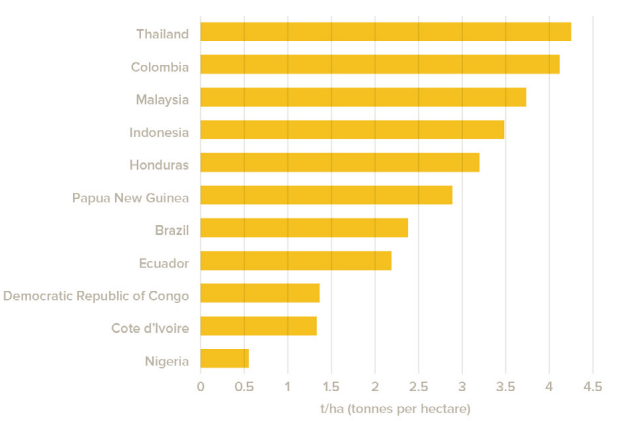
Tech & Sci
13:50, 28-Jun-2018
Palm oil is bad for the environment, but alternatives are worse, says report
Updated
13:24, 01-Jul-2018
Alok Gupta

Counter to the demand from conservationists to seek alternatives to palm oil – notorious for its depletion of forest cover and effects on the habitats of iconic wild animals – an authoritative report claims the alternatives would actually be more devastating to biodiversity.
In recent years, conservationists have been seeking a ban on palm oil production due to its destruction of rainforests and significant impact on the orangutan, gibbon and tiger population. Palm oil's massive environmental impact have led conservationists to call for a reduction in palm farming, replacing it with soy, corn, and rapeseed to fulfill the global hunger for vegetable oil.
Indonesia and Malaysia together account for 85 percent of the world’s palm oil production, and their forests are also the natural habitat of Bornean orangutans, found only on Borneo and Sumatra islands. Both countries have become the worst victims of the 40 billion US dollar palm oil trade.
However, the report "Palm Oil and Biodiversity," from the International Union for Conservation of Nature (IUCN) claimed other oil crops require up to nine times as much land to produce than palm oil and its replacement would significantly increase the total land area used for vegetable oil production.
Rather than calling for alternatives, the report suggested that avoiding further palm oil-related deforestation will deliver the biggest gains for biodiversity by far. “When you consider the disastrous impacts of palm oil on biodiversity from a global perspective, there are no simple solutions,” said IUCN Director General Inger Andersen.
Palm oils comprise 35 percent of the world’s vegetable oil on nearly 10 percent of the land allocated to oil crops. India, China, and Indonesia are major consumers of vegetable oil. In the 1930s, palm oil contributed less than three percent to global vegetable oil production.
Groundnuts, cottonseed, and linseed dominated the vegetable oil consumption. Now, eight decades later, soybean and palm oil make up over 60 percent of the world’s vegetable oils.
More than 75 percent of the palm oil produced globally is used for food – as cooking oil and in processed foods – with the rest used in cosmetics, cleaning products and biofuel.
“Half of the world’s population uses palm oil in food, and if we ban or boycott it, other, more land-hungry oils will likely take its place,” Andersen added.

Palm oil yields in major producing countries from FAOSTAT for 2013 showing the major variation in palm oil yields between
countries. /IUCN Photo
Palm oil yields in major producing countries from FAOSTAT for 2013 showing the major variation in palm oil yields between countries. /IUCN Photo
“Palm oil is here to stay, and we urgently need concerted action to make palm oil production more sustainable, ensuring that all parties – governments, producers, and the supply chain – honor their sustainability commitments.”
The massive demand for palm oil, the report claimed, is damaging global biodiversity, with 193 species assessed as threatened on the IUCN Red List. Palm oil farming, which is currently decimating the biodiversity in Malaysia and Indonesia, is likely to spill over to tropical Africa and America as production expands to meet demand, the report warned.
The devastating effect of the palm plantation could potentially harm 54 percent of the world’s threatened mammals, and 64 percent of all threatened birds.
“Palm oil is decimating Southeast Asia’s rich diversity of species as it eats into swathes of tropical forest,” said Chair of IUCN’s Oil Palm Task Force, Erik Meijaard. “But if it is replaced by much larger areas of rapeseed, soy or sunflower fields, different natural ecosystems and species may suffer.”
Certified palm oil that ensures an ethical supply chain has proven to be only marginally better in terms of preventing deforestation than its non-certified equivalent, but the approach is relatively new and holds potential for improving sustainability, reports suggested.
IUCN experts are trying to get governments in countries producing palm oil to implement policies that limit demand for non-food uses of palm oil. In recent years, the aviation sector has started seeking large-scale use of palm oil as biofuel to reduce fossil fuel emissions.
Improved consumer awareness in the top consuming countries – India, China and Indonesia – could substantially increase demand for certified palm oil, IUCN recommended.
“To put a stop to the destruction, we must work towards deforestation-free palm oil, and make sure all attempts to limit palm oil use are informed by a solid scientific understanding of the consequences,” Meijaard added.
(Cover Image: A group of young orangutans orphaned during land clearing for palm plantations in Indonesia. /VCG Photo)

SITEMAP
Copyright © 2018 CGTN. Beijing ICP prepared NO.16065310-3
Copyright © 2018 CGTN. Beijing ICP prepared NO.16065310-3